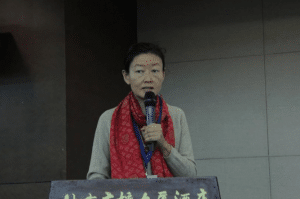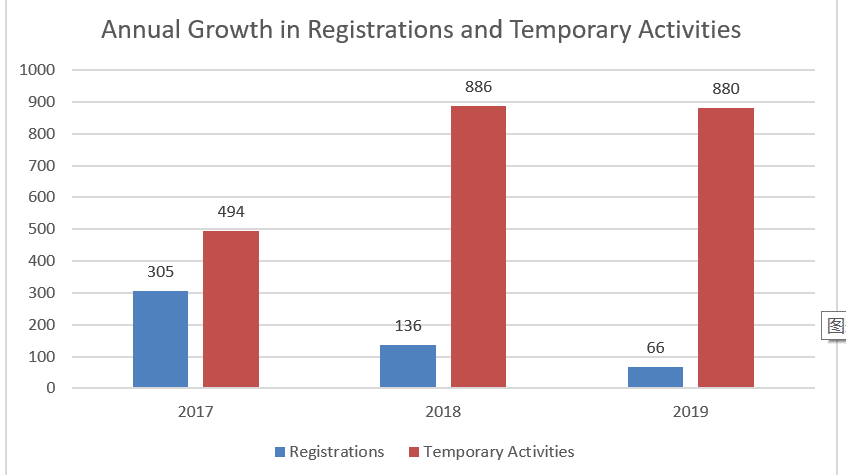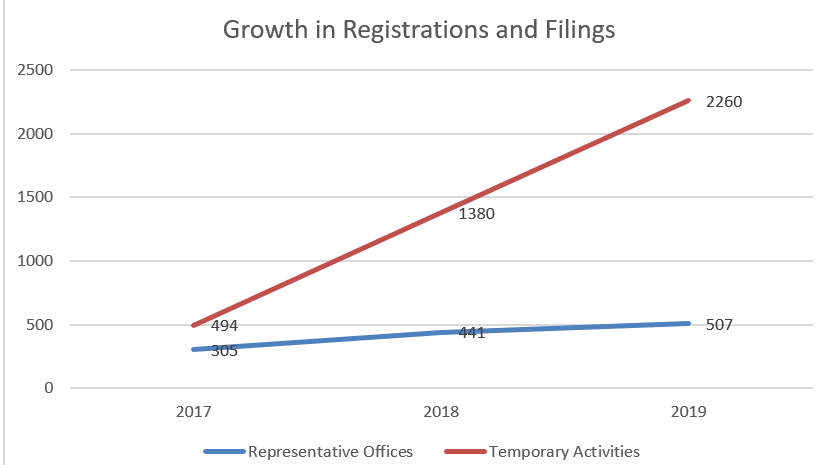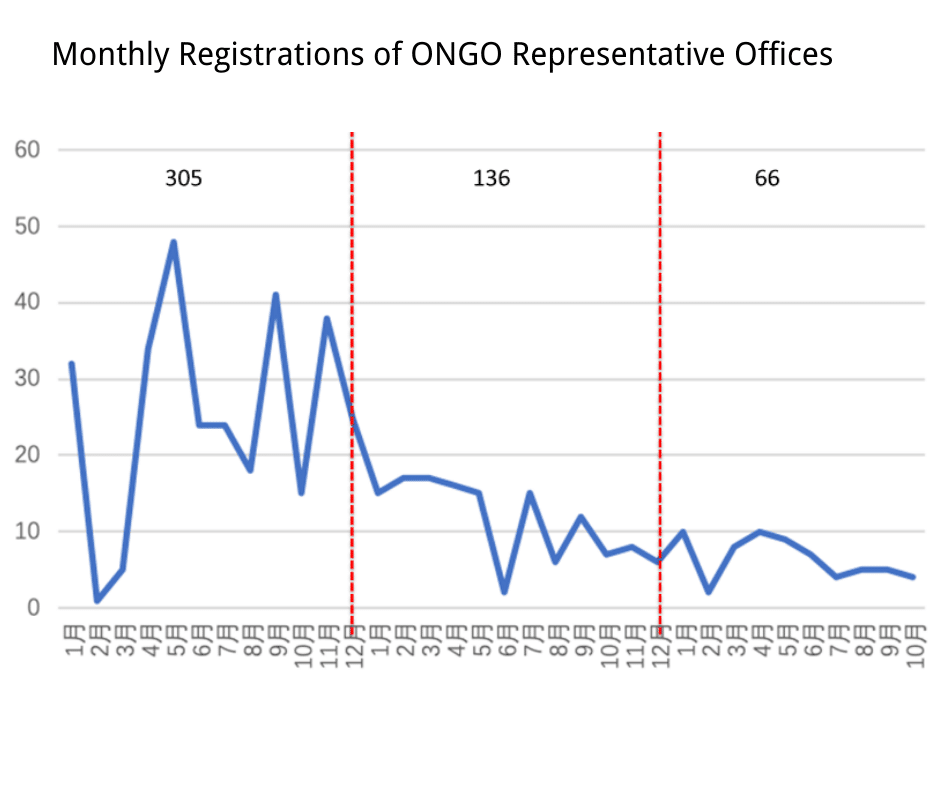This is a translation of the talk that prof. Jia Xijin, from Tsinghua University’s School of Public Policy and Management, gave at the CDB Forum 2019, held in Beijing on the 11th of November. The talk reviews the implementation of China’s law on Overseas NGOs over the last three years, and discusses how NGOs from around the world can continue thriving in China in the future. We have also included translations of some of the graphics that Prof. Jia presented during her talk. You can find the original version of the talk in Chinese here.

A review of the first three years of the “Overseas NGO Law”
As you all know, the “Law on the Management of the Activities of Overseas NGOs within Mainland China” has been in effect for three years already, so I would like to take this opportunity to review the situation from two angles: the legal system, and the situation regarding the registration of overseas NGOs.
I will start from the legal system. The first year after the law was passed was a preliminary phase, in the second year some trends became apparent, and in the third year it became possible to make out some clear patterns. Let’s compare the situation over the last three years, and see what changes emerge.
After the Overseas NGO Law was made public on the 28th of April 2016, a series of related documents was released: on the 28th of November 2016, the MPS followed up with the “Guidelines for Registering a Representative Office and Filing to Conduct Temporary Activities for Overseas NGOs”, and then on the 20th of December they published the “List of Fields of Activity, Categories of Projects and Professional Supervisory Units for Overseas NGOs Carrying Out Activities in Mainland China (2017)”; on the 1st of January 2017, the Overseas NGO Law was officially implemented; on the 9th of January 2017, the MPS published the “Online Registration Handbook (version 1.0)” and the “Filing Temporary Activities Online Handbook (Version 1.0)”; on the 19th of January 2017, the State Administration of Taxation released the “Notice on Carrying out the Work on Tax Registrations”; on the 16th of March, the PSB released the contact information for a further 43 PSUs; in May 2017, the People’s Bank of China and the MPS jointly released the “Notice on Work Related to the Management of RMB Bank Accounts”; in August 2017, the State Administration of Foreign Experts Affairs and the MPS jointly released the “Notice on Handling the Work Permits of Foreign Employees of Overseas NGOs“. Finally in March this year the PSB released the “List of Fields of Activity, Categories of Projects and Professional Supervisory Units (PSUs) for Overseas NGOs Carrying out Activities in Mainland China”, updated for 2019.
By now it seems that the related documents from the MPS and the main other relevant bodies have already been completed, and in the next few years there won’t be any more formal documents published, although there might still be new regional rules.
The only recent update was the release of the updated list of fields of activity and PSUs for 2019, which has both additions and removals. For instance, the Chinese People’s Association for Friendship with Foreign Countries was added to the list in 2019. Out of the PSUs, the National Forestry and Grassland Administration published a special set of rules for cooperation and communication with Overseas NGOs in 2017.
Now that we have reached the three year mark, let’s take a look at the official service platform for Overseas NGOs (http://ngo.mps.gov.cn). Three years ago, at the end of January 2017, out of 32 provincial-level work service offices, 18 had a website, and 14 had no link. By the end of July 2017, only 4 had no link.
In November this year, I found out an interesting phenomenon: 15 offices had broken links, while 10 of them had websites.
Looking at the local management offices for overseas NGOs, Guangdong is certainly the one with the most updated material. Not only did they update their own lists following the national ones, but they also publicised their own procedures and rules, for instance with a notice on procedures and a guide on registrations and filings translated into English, a list with the contact information of part of the PSUs, a list of fields of activity and a directory of PSUs for Guangdong, a sample for a cooperation agreement between a Chinese partner and an overseas NGO, and a notice on filing temporary activities for ONGOs. A lot of improvements have thus been made in the procedures.
Secondly, let’s turn to the registration of offices and the filing of temporary activities by overseas NGOs.


Looking at these two graphs, what we can see is that the total number of registrations of representative offices has increased very slowly, while the total number of filings of temporary activities has seen a fast upswing. In fact, the number of registrations has halved with every passing year. Of course, this doesn’t mean that it will continue to lessen, because most of the NGOs that were going to register did so in the first year, while over the second and third years numbers dropped to what will probably be the normal level in the future.
 Let’s look at a few further points.
Let’s look at a few further points.
First of all, the places of registration: by the end of 2017, Beijing registered 106 offices, Shanghai 71, Yunnan 22, Guangdong 15, Liaoning 13 and Sichuan 12. These six places took up 78% of total registrations.
By the end of 2018, Beijing, Shanghai, Yunnan, Guangdong and Sichuan took up 71%. In 2019, 66 new offices have been added so far in 18 provinces, with 13 in Beijing, 12 in Shanghai and 9 in Guangdong.
By the end of 2017, there were six places with no registrations: Hebei, Xinjiang, Ningxia, Hainan, Shanxi and Xinjiang Bingtuan. By the end of 2018, only Ningxia, Shanxi, Xinjiang and Xinjiang Bingtuan still had no registrations. By October 2019, it was still the same.
Secondly, let’s look at the PSUs; by the end of 2017, the Shanghai Commission of Commerce had 32 ONGOs under its supervision, the MCA had 11, and the Chinese People’s Association for Friendship with Foreign Countries had 7.
By the end of 2018, the Shanghai Commission of Commerce had 74 ONGOs under its supervision, the Beijing Commission of Commerce had 36, the Liaoning Commission of Commerce had 15, and the Chinese People’s Association for Friendship with Foreign Countries had 14.
Out of the 46 new ONGOs to register in 2019, the Shanghai Commission of Commerce took charge of 7, the Guangdong Department of Commerce 4, and the Guangdong Department of Education 4.
Let’s also look at the permitted scope of work; in 2017, about a third of offices could work nationally, a third in multiple provinces, and a third in a single province; in 2018, it was the same; in 2019, out of the 66 new offices, 25 had a national scope of activity, 11 had a cross-provincial scope, and 30 were limited to a single province.
From these figures we can see some of the patterns and trends from the last three years. First of all, the registration of representative offices has been gradually slowing down and stabilizing. The filing of temporary activities has also evened out and remained at the same level. The places with the most registrations are Beijing, Shanghai, Guangdong, while the places with no registrations are still the same; The places with the most temporary activities are Guangdong, Beijing, Yunnan, Guizhou and Zhejiang. In terms of the field of work and PSU, trade definitely takes the lead. In terms of the location of work, activities limited to a single province are the majority, followed by national and cross-province activities.
The trends we can observe in the first year of implementation prove three points. The first point is the “initial effect”. The first year is a baseline from which you can predict the law’s future implementation. Essentially, the way in which things were carried out in the beginning in a certain field reflects what happened later. The initial attitude taken by PSUs or organs dealing with registration basically determined their future path.
The second point is minority contribution; a minority of localities, PSUs and departments have undertaken the great majority of ONGOs’ registrations and temporary activities.
The third point is special cases. The trends we have just seen are not applicable to special cases, which can always occur due to various factors.
Achievements and challenges since the Overseas NGO Law was passed
Achievements
When it comes to the achievements of overseas NGOs in China, there has been a big change in terms of numbers, since in the previous 30 years there were only 20 (registered) overseas NGOs, but over the three years since the law’s implementation this figure has risen to 500. There has also been a big change in terms of legal recognition, and after the law was passed overseas NGOs in China became very dynamic. Which areas are the most dynamic?
The first area is trade associations; all over the country, they are particularly active.
Secondly, there are differences according to the location: Beijing, Shanghai, Guangdong, Yunnan are particularly lively in this area, and of course there are a few other places, like Guizhou and Liaoning, that can be considered moderately lively. There are always factors of politics, economy, history and international status behind these regional differences.
Thirdly, there are differences according to the PSU: local commissions of commerce are the most active and open, and the Shanghai Commission of Commerce acts as supervisor to the largest number of NGOs; while organizations registered under the Chinese People’s Associations for Friendship with Foreign Countries all have deep historical roots and contributions to China. The Forestry Bureau, on the other hand, is the only organ that published open rules of cooperation as a PSU, and built up an internal procedure.
Fourthly, there is a difference between registering an office and conducting temporary activities. The filing of temporary activities is becoming the norm everywhere. For organizations that haven’t registered an office, filing a temporary activity is a simpler path, so it is becoming a routine mode of operation.
Finally, when it comes to PSUs there is still a lot of space for the development of individual cases.
Challenges
For ONGOs, the big challenge in the first year of the law’s implementation was finding a PSU and registering. In the second and third year the situation has remained stable; by this stage most overseas NGOs in China had already achieved a legal status, and looking for a PSU was no longer the main issue. The biggest challenge in the current period is the operational costs. After achieving legal status it’s necessary to do a lot of talking and negotiating, and this imposes a cost in terms of time, human resources, energy and funds.
This cost is perhaps the most common and obvious problem. It is connected with the issue of how to manage things in a streamlined fashion, and how to conduct operations in an independent and legal fashion. This cost is not only connected with financial resources, but also with human resources, as it will affect the staff’s drive and motivation. Some very professional and high-level management staff have started to change jobs or resign, with some of them completely abandoning the sector.
Secondly, when it comes to the registration and management authorities, cooperation with the PSUs remain the core work, including communicating before registration, apportioning responsibility after registration, and jointly accomplishing the functions of management, law enforcement and providing legality. As an example after registering a lot of organizations find they still can’t carry out their activities in the relevant areas, for instance across provinces or in other administrative regions.
There are also the issues of fundraising and membership. Although fundraising isn’t allowed within China, what about accepting donations? And what about international donations? How about local organizations fundraising abroad? Then there’s the issue of developing a membership and of “localization”, which will produce a series of problems. Those ONGOs that haven’t completed their registration still have the chance to do so, but after registering they will still face these common challenges.
The development of overseas NGOs under the “new era” and the “new normal”
Looking at the patterns from the last three years, what is the future for overseas NGOs? I will use two terms to summarize the development of overseas NGOs from the perspective of international and local organizations.
The first term is the “new era” in politics. The era of Reform and Opening Up, of “crossing the river by feeling the stones”, lasted 30 years. Now we have entered a new era with the main characteristics of systematic, law-based governance. There is a rigidity to the system, and a flexibility to the society. So in this more systematised era, where is the space for action? How can social flexibility be understood? This is perhaps the most important thing that ONGOs have to consider when drawing up their strategy.
The second term is the “new normal” in economics. China’s sustained high-speed economic growth is unlikely to continue at present, and with the slowdown there will come a downward pressure that will bring a series of challenges, constituting a “new normal”. The political changes compared to the previous era, and the economic challenges that will continue to be faced in the future constitute the new environment of social development which ONGOs have to account for when positioning themselves.
Cooperation and Progress
China is in the process of moving towards systemic and law-based governance. In the current very challenging economic situation, what should the strategic positioning of overseas NGOs in China be? What does their role mean for China, and for our Reform and Opening Up?
In this new strategic positioning, there are a few relationships with partners that may become particularly important for ONGOs.
The first is local Chinese social organizations; the aim of some overseas NGOs is to allow local social organizations to develop as much as possible. So what is the situation for Chinese social organizations themselves? Have they developed a new assessment of their role in this respect, or is their relationship with overseas NGOs stuck in the past?
The second is grassroots organizations; ONGOs need to discuss how to build a relationship with grassroots organizations.
The third is interaction with the government; this involves not only the interaction between the ONGO’s representative office and the managing departments, but also the whole government strategy and the internal and external interactions of the ONGO and its headquarters. The mutual dependence between these three players has to realize the intentions of each one. For overseas NGOs a lot of strategizing and skill is involved in balancing these relationships.
The fourth is the relationship between overseas NGOs; including some organizations that haven’t registered; could there be a platform for cooperation and donations, including attempts to localize interactions?
The fifth is the special position of organizations from Hong Kong, Macau and Taiwan. About a fourth of the ONGOs are from these three places, and they have a special position. There are many ONGOs that are registered in Hong Kong, and want to use it as an intermediary to conduct work in the Mainland. Perhaps there needs to be a rethink towards the efficacy of this path.
In summary, I feel that it was very fitting for CDB to make “cooperation and common progress” the theme of this year’s forum. After three years, it can be said that the implementation of the Overseas NGO law has come close to a stable situation.
In the future, apart from the need to continue improving the way in which the law is implemented, what is more important is for Overseas NGOs to rethink their approach and how to position themselves within China’s overall strategy in the new political and economic situation.
Translation by Gabriel Corsetti



